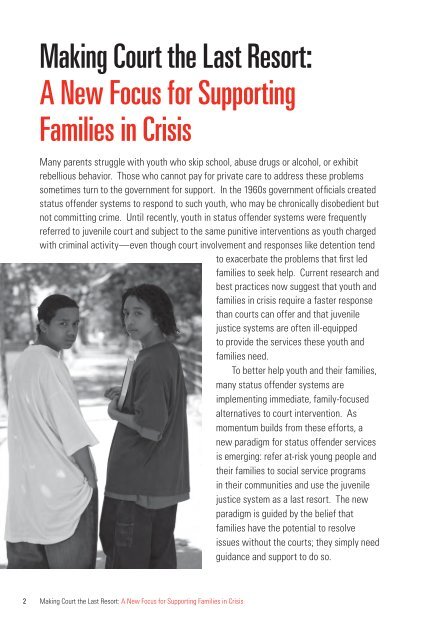Making Court the Last Resort - Center for Children's Advocacy
Making Court the Last Resort - Center for Children's Advocacy Making Court the Last Resort - Center for Children's Advocacy
Models for ChangeModels for Change is an effort to create successful and replicable models of juvenile justicereform through targeted investments in key states, with core support from the John D. andCatherine T. MacArthur Foundation. Models for Change seeks to accelerate progress towarda more effective, fair, and developmentally sound juvenile justice system that holds youngpeople accountable for their actions, provides for their rehabilitation, protects them from harm,increases their life chances, and manages the risk they pose to themselves and to the public.The initiative is underway in Illinois, Pennsylvania, Louisiana, and Washington and, throughaction networks focusing on key issues, in California, Colorado, Connecticut, Florida, Kansas,Maryland, Massachusetts, New Jersey, North Carolina, Ohio, Texas, and Wisconsin.
Making Court the Last Resort:A New Focus for SupportingFamilies in CrisisMany parents struggle with youth who skip school, abuse drugs or alcohol, or exhibitrebellious behavior. Those who cannot pay for private care to address these problemssometimes turn to the government for support. In the 1960s government officials createdstatus offender systems to respond to such youth, who may be chronically disobedient butnot committing crime. Until recently, youth in status offender systems were frequentlyreferred to juvenile court and subject to the same punitive interventions as youth chargedwith criminal activity — even though court involvement and responses like detention tendto exacerbate the problems that first ledfamilies to seek help. Current research andbest practices now suggest that youth andfamilies in crisis require a faster responsethan courts can offer and that juvenilejustice systems are often ill-equippedto provide the services these youth andfamilies need.To better help youth and their families,many status offender systems areimplementing immediate, family-focusedalternatives to court intervention. Asmomentum builds from these efforts, anew paradigm for status offender servicesis emerging: refer at-risk young people andtheir families to social service programsin their communities and use the juvenilejustice system as a last resort. The newparadigm is guided by the belief thatfamilies have the potential to resolveissues without the courts; they simply needguidance and support to do so.2 Making Court the Last Resort: A New Focus for Supporting Families in Crisis
- Page 1: Making Court the Last Resort:A New
- Page 5 and 6: Although the Florida Department of
- Page 7 and 8: The FINS/CINS model that Florida de
- Page 9 and 10: amended to enhance diversion requir
- Page 11 and 12: and services for status offenders.
- Page 13 and 14: “Prior to implementation we had a
- Page 15 and 16: Endnotes1 Florida statute defines e
- Page 17 and 18: Notes16 Making Court the Last Resor
- Page 19 and 20: An initiative supported by the John
<strong>Making</strong> <strong>Court</strong> <strong>the</strong> <strong>Last</strong> <strong>Resort</strong>:A New Focus <strong>for</strong> SupportingFamilies in CrisisMany parents struggle with youth who skip school, abuse drugs or alcohol, or exhibitrebellious behavior. Those who cannot pay <strong>for</strong> private care to address <strong>the</strong>se problemssometimes turn to <strong>the</strong> government <strong>for</strong> support. In <strong>the</strong> 1960s government officials createdstatus offender systems to respond to such youth, who may be chronically disobedient butnot committing crime. Until recently, youth in status offender systems were frequentlyreferred to juvenile court and subject to <strong>the</strong> same punitive interventions as youth chargedwith criminal activity — even though court involvement and responses like detention tendto exacerbate <strong>the</strong> problems that first ledfamilies to seek help. Current research andbest practices now suggest that youth andfamilies in crisis require a faster responsethan courts can offer and that juvenilejustice systems are often ill-equippedto provide <strong>the</strong> services <strong>the</strong>se youth andfamilies need.To better help youth and <strong>the</strong>ir families,many status offender systems areimplementing immediate, family-focusedalternatives to court intervention. Asmomentum builds from <strong>the</strong>se ef<strong>for</strong>ts, anew paradigm <strong>for</strong> status offender servicesis emerging: refer at-risk young people and<strong>the</strong>ir families to social service programsin <strong>the</strong>ir communities and use <strong>the</strong> juvenilejustice system as a last resort. The newparadigm is guided by <strong>the</strong> belief thatfamilies have <strong>the</strong> potential to resolveissues without <strong>the</strong> courts; <strong>the</strong>y simply needguidance and support to do so.2 <strong>Making</strong> <strong>Court</strong> <strong>the</strong> <strong>Last</strong> <strong>Resort</strong>: A New Focus <strong>for</strong> Supporting Families in Crisis



